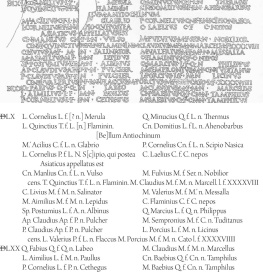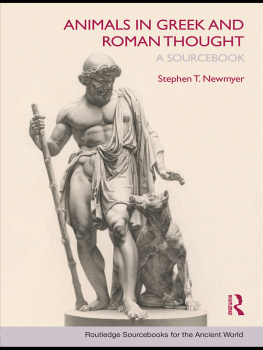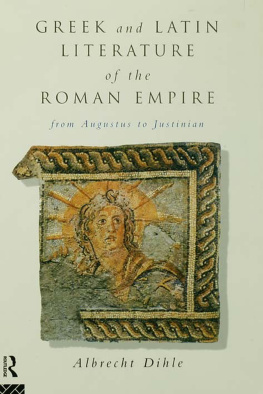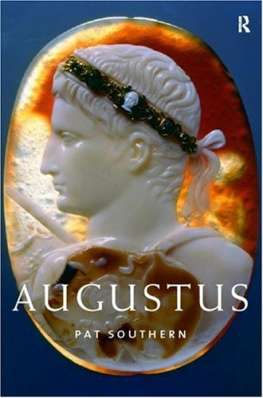PREFACE
The need of a reinterpretation of Greek economic theory in the light of our modern humanitarian economy is presented in the introduction to this work. If this volume may, in some degree, meet such a need, by awakening the classicist to the existence of important phases of Greek thought with which he is too unfamiliar, and by reminding the economist of the many vital points of contact between Greek and modern economy, our labor will have been amply repaid. There are doubtless errors both in citations and in judgment which will not escape the critics eye. We trust, however, that the work is, on the whole, a fair representation of the thought of the Greeks in this important field. In the course of our study, we have naturally been obliged to make constant reference to the actual economic environment of the Greeks, as a proper background for their theories. It is therefore our purpose to publish, at some future date, a general history of economic conditions in Greece, which may serve as a companion to this volume.
We gladly take this opportunity to express our gratitude to Professor Paul Shorey, of the University of Chicago, for his suggestion of the subject of this work, as also for his many helpful criticisms and suggestions during the course of its preparation.
Lawrence College, Appleton, Wis.
November 1, 1915
CONTENTS
I. Introduction
1. Previous works on Greek economic thought.
2. Scope, purpose, method.
3. General characteristics of Greek economic thought.
II. Economic Ideas before Plato, and Reasons for the Undeveloped Character of Greek Economics
III. Plato
1. General standpoint.
2. Theory of value.
3. Wealth: theory; moral attitude.
4. Production.
a) Agriculture.
b) Capital.
c) Labor and industry:
(1) Platos attitude toward.
(2) Division of labor.
(3) Slavery.
5. Money: theory; moral attitude; interest.
6. Exchange: theory; criticism of Platos negative attitude.
7. Population.
8. Distribution: theory; attitude toward laboring classes.
9. Communistic and socialistic ideas.
a) Reasons for such tendencies in Greek thought.
b) Republics before Plato: Hippodamas; Phaleas.
c) Platos Republic.
d) Platos Laws.
IV. Xenophon
1. Double standpoint.
2. Theory of value.
3. Wealth: practical interest in.
4. Production.
a) Theory; positive interest.
b) Agriculture.
c) Capital.
d) Labor and industry.
(1) Positive interest in its development.
(2) Division of labor.
(3) Slavery.
5. Money: theory; in favor of unlimited increase.
6. Exchange: proposed means for its free development.
7. Population.
8. Distribution: attitude toward masses.
9. Socialistic tendencies in the Revenues.
V. The OratorsDemosthenes, Isocrates
VI. Aristotle
1. Attitude toward matters economic; domestic and public economy.
2. Theory of value.
3. Wealth: theory; negative attitude toward.
4. Production: theory; negative standpoint.
a) Agriculture.
b) Capital: theory; negative interest.
c) Labor and industry.
(1) Negative attitude.
(2) Division of labor.
(3) Slavery.
5. Money: origin; theory; interest; reasons for the negative attitude of Aristotle and other Greek philosophers.
6. Exchange: theory; tariff; criticism of chrematistik.
7. Population.
8. Distribution: theory; attitude toward masses.
9. Communism and socialism.
a) Negative criticism of Platos Republic and other systems.
b) Positive theory.
VII. Minor Philosophers, Contemporaries or Successors or Plato and Aristotle
1. The Academy, Speusippus, Xenocrates, Crantor.
2. Theophrastus.
3. Economica; the pseudo-Aristotelian Economica.
4. Cyrenaics: Aristippus; Bion.
5. Epicureans.
6. Cynics: Antisthenes; Diogenes; Crates.
7. Pseudo-Platonic Eryxias.
8. Teles.
9. Stoics: Zeno; Aristo; Cleanthes; Chrysippus; Plutarch.
10. Communistic tendencies after Aristotle.
VIII. General Conclusions on the Importance and Influence or Greek Economics
Bibliography 151
Index 157
CHAPTER I
INTRODUCTION
For a complete list of scholars who have devoted more or less attention to the economic ideas of Greek thinkers, the reader is referred to the bibliography at the conclusion of this work. On the surface, the list appears to be reasonably extensive. It will be observed, however, that the majority of the works are not of recent date; that many of them deal largely with the practical phase of economics; that most of the larger works on economic history treat Greek economic and social theory in a merely incidental manner, and that nearly all are written from the general standpoint of the economist rather than with the more detailed analysis of the classicist. The work of Souchon, the most extensive, careful, and satisfactory discussion of the subject, is no exception to this latter rule, and since his standpoint is too exclusively that of the older English economists, his criticism of the Greek theories is not always sufficiently sympathetic. The monumental volumes of Poehlmann have treated Greek social theories thoroughly, but the chief interest of the author is rather in the actual social conditions, and his work is marred by a constant overemphasis of the analogy between ancient and modern capitalism and socialistic agitation. Moreover, there is no book in the English language, on Greek economic thought, that treats the subject in anything more than the cursory manner of Haney and Ingram. There is, thus, still a place for a work of this type in the English language, written from the standpoint of the classicist, but with a view also to the needs of twentieth-century students of economics.
The present work aims to fulfil such a need. Its scope differs quite essentially from all other accounts of Greek theory previously published, in that our purpose is not merely to consider the extent to which the Greek thinkers grasped the principles of the orthodox economy of Ricardo and Mill. We shall also endeavor to ascertain how far they, by the humanitarian and ethical tone of their thinking, anticipated the modern, post-Ruskin economy, which makes man, not property, the supreme goal, and recognizes the multiplicity of human interests and strivings that belie the old theory of the economic man. Our verdict as to the importance of the Greek contribution to economic thought is thus likely to be somewhat more favorable than that which is usually rendered.







